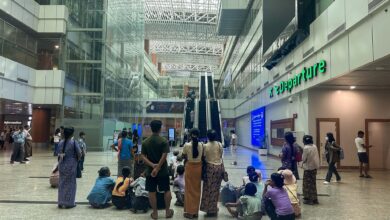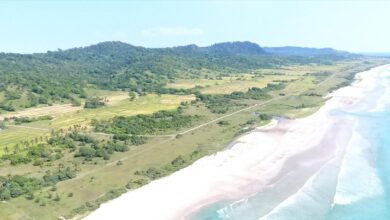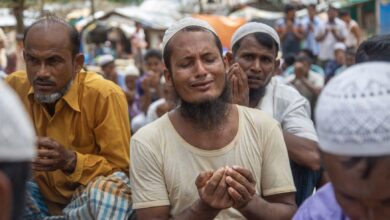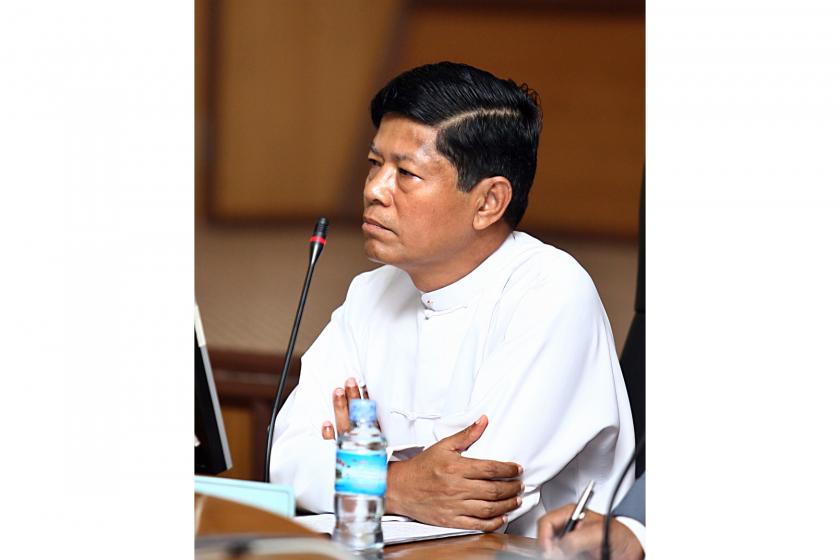
Soon after the military seized power on February 1, one of the first acts of the newly formed junta was to replace the chair of the Union Election Commission (UEC).
This was hardly surprising, given that alleged irregularities in last year’s election served as the pretext for the coup. But if the generals really cared about election integrity, they had a strange way of showing it. Thein Soe, the man they chose to lead the UEC, was not anyone’s idea of a paragon of probity.
Nor was he new to the job. He was, in fact, the first person to head the commission when it was formed ahead of the 2010 election. And it was at that time that he made a name for himself as a master of electoral shenanigans.
The former general, who previously served as military judge advocate-general and deputy chief justice of the Supreme Court, was notorious in his new role for allowing blatant vote-stealing by the military-backed Union Solidarity and Development Party (USDP), which went on to win the election.
“I don’t think there’s any need for me to say what kind of man he is. Everyone knows that already,” said Mya Nandar Thin, the founder of the Myanmar Network for Free Elections.
There were more than 40 confirmed cases of fraud in Yangon and Bago alone when Thein Soe last served as the UEC chair, she recalled.
It was Thein Soe, she said, who was chiefly responsible for the disappearance of ballot boxes from polling stations in 2010, and the equally mysterious appearance of huge quantities of USDP votes that usually turned up in the middle of the night.
“I don’t think there’s any need for me to say what kind of man he is. Everyone knows that already.”
A decade later, Thein Soe’s return is seen by Mya Nandar Thin and many other observers as evidence of the regime’s determination, after two resounding defeats at the polls, never to lose again.
A ridiculous farce
To ensure that the 2010 election delivered the desired outcome, Thein Soe had to make sure that it wasn’t too carefully scrutinized.
That meant, among other things, preventing foreign reporters and other outside observers from entering the country.
“There’s no need for foreign journalists” to cover the election, he said during a press conference held a month before the vote. “Myanmar already has journalists and the Information Ministry will be handling it.”
It is unlikely, however, that his audience of handpicked reporters took this as an expression of Thein Soe’s confidence in their abilities. In any case, even they were blocked from observing township-level vote counts.
Sithu Aung Myint, a veteran journalist who covered the 2010 election, said it was abundantly clear what purpose the UEC served under Thein Soe.
“They were tasked with realizing the results that the dictators wanted to see,” he said, adding that the UEC committed massive electoral fraud during Myanmar’s first election in 20 years.
Key to the USDP’s victory was the use of advance votes. Local administrators voted on behalf of entire wards or villages, guaranteeing that every ballot was cast in favour of the military’s proxy party.
“They were tasked with realizing the results that the dictators wanted to see.”
“They just did as they pleased and released the results that they wanted,” Sithu Aung Myint said of the rigged voting process that he witnessed a decade ago.
Journalists and activists saw the whole thing for what it was, he said—a ridiculous farce.
Parties that took part in the election found it more difficult to laugh off Thein Soe’s skulduggery, but were equally powerless to do anything about it.
The National Democratic Force (NDF), formed by National League for Democracy (NLD) members who left the party over its boycott of the election, saw many expected victories slip away overnight after the inevitable arrival of bulk votes.
In the end, the party won just 16 of the 161 seats it contested. The USDP, meanwhile, walked away with 388 seats, or nearly 80% of the total up for grabs.
Khin Maung Yi, the NDF’s candidate for Ahlone constituency in Yangon, spoke for many when he said, “I would like it if the people appointed [to the UEC] were honest and neutral.”
But that simple wish, which seemed possible once Thein Soe stepped down as UEC chair after the election, is now more unattainable than ever.
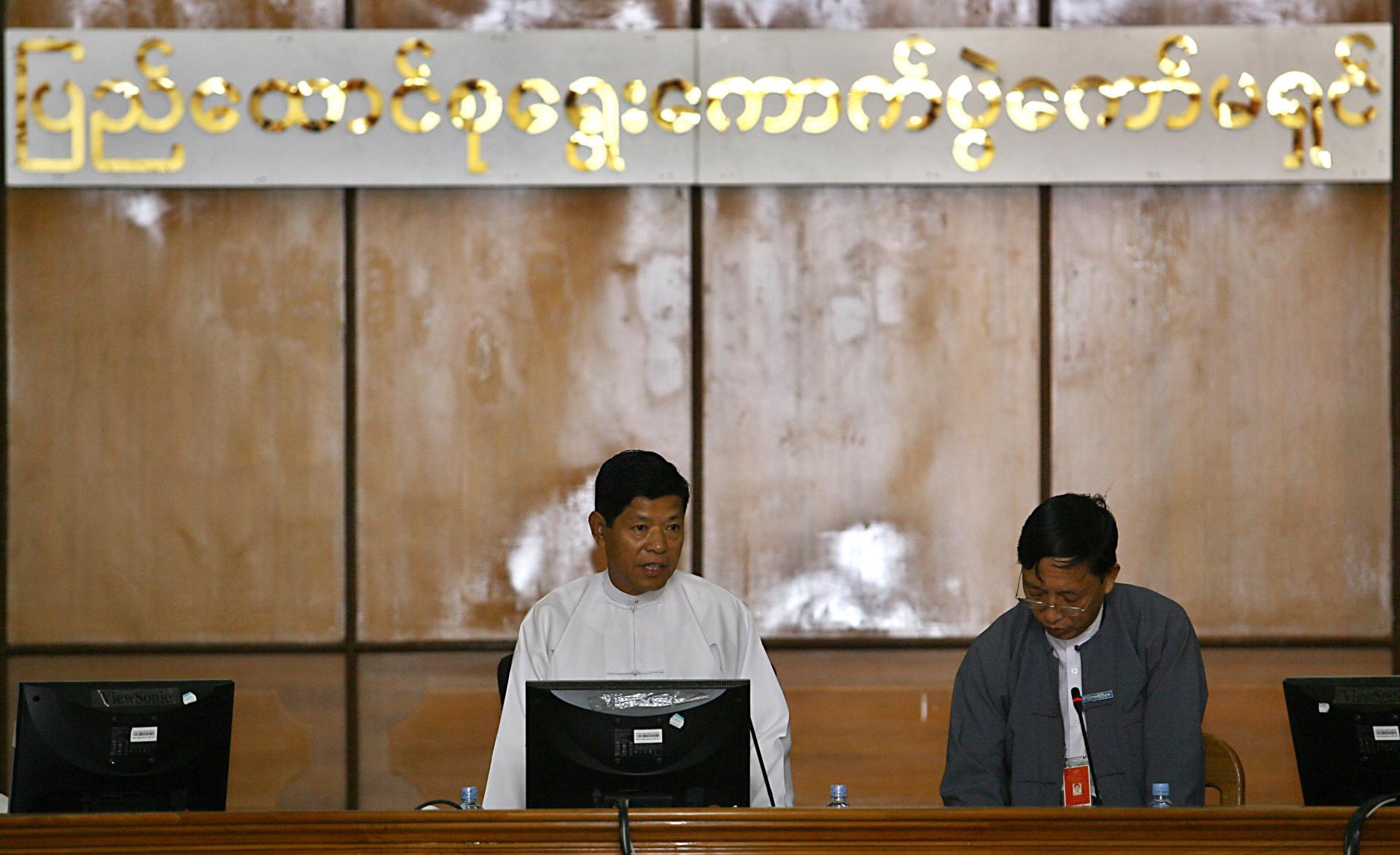
Doing away with the NLD
Thein Soe has made no secret of how he intends to achieve a repeat of his past success at fixing elections.
At a press conference held on May 20, he declared that the NLD, which won landslide victories in both 2015 and 2020, would be dissolved, clearing the way for the regime’s proxy party to rule again.
“The NLD’s license needs to be revoked for violating the law. We’ll take action against all individuals who committed high treason,” he told journalists.
In this, he is merely doing the bidding of Senior General Min Aung Hlaing, the mastermind behind the February 1 coup, according to Sithu Aung Myint.
“It’s simple. Min Aung Hlaing appointed him to get rid of the NLD and erase the 2020 election results. The next election won’t be like the last two. It will be the same as 2010. They won’t let any foreign observers in,” he said.
“And for sure they’ll try to put Min Aung Hlaing in as president,” he added.
“It’s simple. Min Aung Hlaing appointed him to get rid of the NLD and erase the 2020 election results. The next election won’t be like the last two. It will be the same as 2010. They won’t let any foreign observers in.”
After his previous stint as UEC chair, Thein Soe was promoted in February 2011 to another high-profile position as chair of the constitutional tribunal.
However, a falling-out with Thura Shwe Man, the speaker of the Pyithu Hluttaw, or lower house of parliament, led to his resignation in September 2012.
Now, after more than eight years out of the spotlight, he has returned to prominence.
But as an integral player in the military’s scheme to hold onto power indefinitely, he has also earned himself some less than welcome attention.
On March 2, he was placed on a list of 11 military leaders facing sanctions from the European Union, and he has also been targeted by the US Treasury Department’s Office of Foreign Assets Control.
What impact this will have on his plans remains to be seen; but if the past is any guide, he will stop at nothing to protect the military from any future humiliation at the ballot box.
